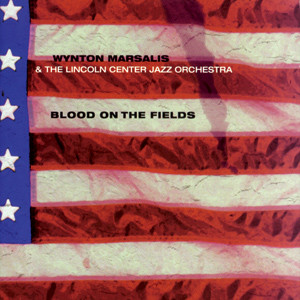“Blood on the Fields” was composed in 1997, and is the first ever jazz composition that has ever won a Pulitzer Prize. It tells the story of two African people (brought to life in the original release tour by singers Cassandra Wilson and Miles Griffith) who are captured and brought to America to be sold as slaves. A performance of “Blood on the Fields” requires a full 15- piece jazz orchestra, two violinists, and three vocalists. My first exposure to the work came through my trumpet teacher, Roger Ingram, who played lead trumpet on “Blood on the Fields,” as well as on many other Jazz at Lincoln Center performances and recordings. I feel very lucky to have been introduced to such a monumental creation by one of its main contributors.
After I first listened to “Blood on the Fields” in its entirety, I realized that its reception of the first ever Pulitzer Prize awarded to a jazz composition is indicative of Marsalis’ willingness to speak plainly and uniquely through music about the horrors of slavery that are often overlooked and/or diminished in many historical accounts. This realization prompted two main thought processes in my mind, and incited me to attempt to break down Wynton Marsalis’ creative process regarding his creation of this particular record.
The first insight I had was that, while Wynton has published and recorded several historical- based compositions, “Blood on the Fields” is arguably the most notable due in large part to its inclusion of spiritual chants, plantation hollers, and other abnormal vocal elements that are not typically found in jazz, or any ensemble- based musical forms for that matter. These vocal elements are performed both by the vocalists and by the band members. I see this inclusion as a direct insight into the “Illumination” step of Marsalis’ creative process. These unique vocal aspects are one of the main things that sets “Blood on the Fields” apart from other commentary- intended musical works. Additionally, unlike most previous extended works written for jazz bands, multiple movements of “Blood on the Fields” serve as standalone movements, separate from the rest of the work. At first, this fact seems odd and unnecessary, but upon hearing the entire work put together, it makes sense in a way that is difficult to convey with words- it is almost like an accumulation of experiences the listener has with the music that have an additive effect on one another.
My second thought process came in the form of a connection made between Wynton’s blunt yet sensitive examination of slavery, and principles which Stravinsky elevated in his explanations about his own creative process. In class, we have discussed/been assigned readings about the involvement of political elements into creative works. Gardner speaks clearly on this topic, saying:
“...Stravinksy illustrated a different point through his own life: the extent to which the making of music is not possible without the externally rigged factor of politics. All creative individuals- especially all musicians- must deal with a set of associates who not only help creators realize their vision but also eventually, with a wider public, determine the fate of the creators’ works” (Gardner 188).
While “politics” are not explicitly expressed in “Blood on the Fields,” the principles of Marsalis’ and Stravinsky’s respective works mirror each other. Both provide commentary on societal occurrences/circumstances that are often avoided due to their complexity and sensitive, painful nature.
Overall, I love “Blood on the Fields” because to me it demonstrates Wynton Marsalis’ insanely creative method of taking polar opposite characteristics and combining them into the same creative idea. In other words, I find “Blood on the Fields” to be jubilant yet painful, unique while still exhibiting essential elements of big band jazz music, and incredibly moving despite its exhaustive nearly three hour runtime. I highly recommend “Blood on the Fields” to everyone, regardless of any musical preferences. It is truly a moving, haunting experience.

I'm so glad you introduced me to this piece! I went and listened to some excerpts and it is absolutely incredible. You are right to say that it is unlike any other jazz piece of the era, and to great effect. There's nothing inherently "political" (and thus disdainful) about simply talking about reality. I can't wait to sit down and listen to the whole thing sometime.
ReplyDeleteGrace, this is a wonderful post! I am always incredibly happy to learn about new music and it's extra special to me when that music has such a powerful meaning behind it. It's not every day that you learn about a piece of music as intriguing as this one. the way you describe the work makes me almost feel like I'm right there with you listening to it. Thank you for sharing an artist that you have such a personal connection to. I loved being able to see the political and musical parallels between Marsalis and Stravinsky-- music truly is a powerful thing!
ReplyDeleteThanks so much for sharing! I had never heard of this artist or this work, but I started listening today after reading your post. I love the way you showcase Marsalis’ creativity and your personal connection to it. I’ve only heard a little bit of this piece so far, but I can already see what you meant about how moving and unique it is, and I know it will be much more rewarding to listen with an understanding of the meaning behind it.
ReplyDelete